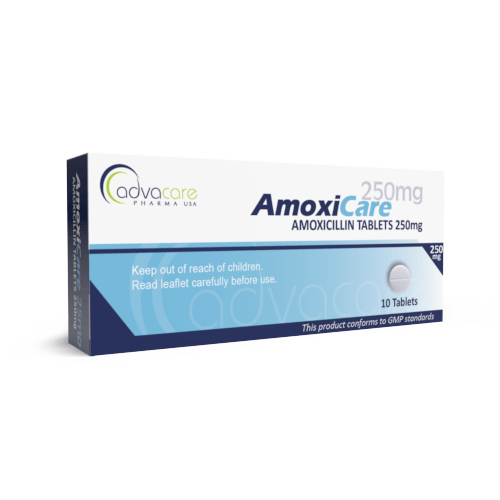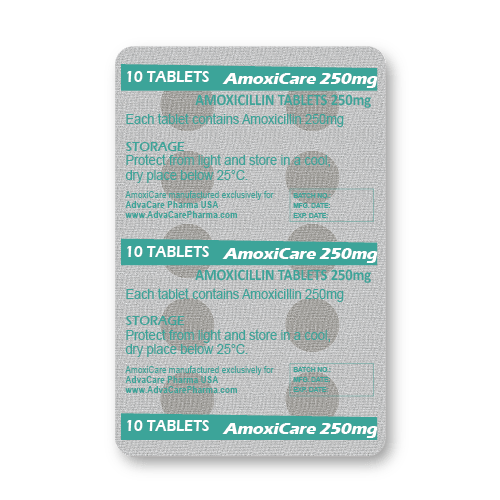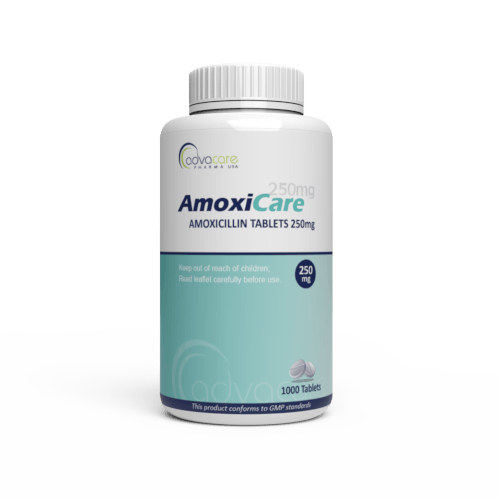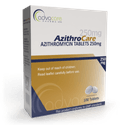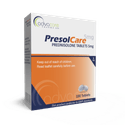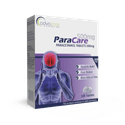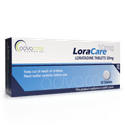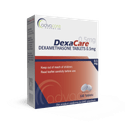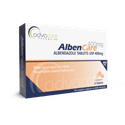- Home›
- Pharmaceuticals›
- Pharmaceutical Tablets›
- Amoxicillin Tablets
Amoxicillin Tablets
Dosage
Packaging
What is Amoxicillin?
Active Ingredients: Amoxicillin
Amoxicillin Tablets are a penicillin antibiotic drug used to treat different types of infections, such as ear infections, bladder infections, pneumonia, gonorrhea, and dental abscesses. This medication is typically a first-choice antibiotic because it is better absorbed than other beta-lactam antibiotics.
Amoxicillin is a moderate-spectrum, beta-lactam antibiotic used to treat bacterial infections caused by susceptible microorganisms. It works by killing bacteria, which prevents growth. This medicine will not work for viral infections.
This antibiotic inhibits penicillin-binding proteins and leads to upregulation of autolytic enzymes and inhibition of cell wall synthesis in bacteria. It has a long duration of action when given twice daily.
When taken orally it is approximately 60% bioavailable and it is 17% protein bound in serum. The main route of elimination is eliminated in the urine after 6 hours: 125mg to 1g doses of amoxicillin are 70-78% eliminated.
This product is also available in the form of capsules.
AdvaCare Pharma is a global distributor and manufacturer of Amoxicillin Tablets. We offer a wide range of high-quality and cost-effective medications that are available for distribution. Our medications are produced in our GMP-certified facilities in China, India, and the USA.
Why are we a leading Amoxicillin manufacturer?
Our entire range of pharmaceuticals, including these Amoxicillin Tablets, have been manufactured under strict GMP regulations.
AdvaCare Pharma, an American pharmaceutical company, is an Amoxicillin manufacturer offering over 200 high-quality and cost-effective oral solid pharmaceutical tablets to meet the needs of the global market. The extensive international network that we partner with includes pharmaceutical distributors, hospitals, pharmacies, and a variety of other institutions.
Uses
What is Amoxicillin used for?
It is used to treat some types of bacterial infections, such as:
- tonsillitis
- bronchitis
- pneumonia
- gonorrhea
- urinary tract infections
How should Amoxicillin Tablets be taken?
This medication is intended to be taken orally. The tablets should be taken whole with a full glass of water. This drug should be taken as advised from a medical professional.
What dose should be taken?
Dosage may vary based on different medical indications:
- For the treatment of bacterial infections in adults, teenagers, and children weighing 40kg or more — 250 to 500mg every 8 hours, or 500 to 875mg every 12 hours.
- For the treatment of bacterial infections in children and infants older than 3 months of age (less than 40kg), the usual recommended dose is 20 to 40mg/kg of body weight per day, divided and given every 8 hours, or 25 to 45mg/kg of body weight per day, divided and given every 12 hours.
- For the treatment of H. pylori infection in adults, the recommendation is dual therapy consisting of 1000mg of amoxicillin and 30mg of lansoprazole, given 3 times per day every 8 hours for 2 weeks. Another option is triple therapy consisting of 1000mg of amoxicillin, 500mg of clarithromycin, and 30mg of lansoprazole, all given two times a day (every 12 hours) for 14 days.
- For the treatment of H.pylori in children the use and dose must be determined by a doctor.
Renal Dosing Dose reduction is not required for patients with impaired renal function unless the impairment is severe. Patients with a glomerular filtration rate (GFR) of less than 30ml/min should avoid the 875mg tablet. For patients with a GFR of 10 to 30mL/min, the recommended dose is 500mg or 250mg every 12 hours, depending on the severity of the infection. Patients with a GFR of less than 10ml/min should take 500mg or 250mg every 24 hours, based on the infection's severity.
Hemodialysis patients should receive 500mg or 250mg every 24 hours, depending on severity of the infection. They should receive an additional dose both during and at the end of dialysis.
Refer to a doctor or pharmacist for guidelines on dosage. The dosage is based on medical condition, response to the treatment, age, and weight.
Is only this antibiotic enough to treat a bacterial infection?
It depends on the severity of the bacterial infections. In some cases, only antibiotics like amoxicillin are enough. Very often, other drugs and supplements can speed up the recovery process. Consult with a healthcare professional to decide the treatment procedure based on your individual needs.
Who can use Amoxicillin?
Amoxicillin is an antibiotic drug that should be used for treating bacterial infections; however, it should be used with caution in the following groups of patients:
Pregnant There are not many studies that prove the safety of Amoxicillin during pregnancy. This antibiotic belongs to the pregnancy category B since animal reproduction studies have failed to demonstrate a risk to the fetus and there are no adequate and well-controlled studies in pregnant women.
Pregnant women should consult with their doctors before taking this antibiotic. It should be used only if the benefits outweigh the risks.
Nursing It has been shown that Amoxicillin is excreted in human milk. It may lead to sensitization of infants. It should be used with caution in nursing women and used only if the benefits outweigh the risks.
Pediatric Pediatric patients have not fully developed renal function and the elimination of amoxicillin may be delayed. Pediatric patients and children should take this form of drug only if they are able to swallow it without a problem.
Geriatric Amoxicillin should be used with caution in elderly people because the drug is eliminated through kidneys and older patients are at increased risk of renal failure. Blood tests and renal function examinations should be performed before giving these tablets to patients older than 65 years.
What should be done in cases of overdose?
In case of overdosage, discontinue the drug and treat the patient symptomatically. If the overdosage is very recent and no contraindications exist, induce emesis or use other methods to remove the drug from the stomach. In case of overdosage also ensure adequate fluid intake and diuresis to reduce the risk of amoxicillin crystalluria.
Other warnings
Amoxicillin should not be taken in concurrent use with probenecid because it may result in increased and prolonged blood levels of amoxicillin.
Patients taking amoxicillin and oral anticoagulants can have abnormal prolongation of prothrombin time (increased INR). Appropriate monitoring is necessary when these medications are used together. Dose adjustments of oral anticoagulants may be required to achieve the desired anticoagulation effect.
Patients with impaired renal function may experience higher blood levels of amoxicillin due to decreased renal clearance. Hemodialysis can remove amoxicillin from circulation.
Concurrent use of allopurinol and amoxicillin increases the incidence of rashes. It is unclear whether this increased rash occurrence is caused by allopurinol itself or the hyperuricemia present in these patients.
Amoxicillin might affect the gut flora and this leads to lower estrogen reabsorption and reduced efficacy of combined oral estrogen/progesterone contraceptives.
Antibiotics like chloramphenicol, macrolides, sulfonamides, and tetracyclines may interfere with the bactericidal effects of penicillin.
Anaphylactic reactions are likely to occur in individuals with a history of penicillin hypersensitivity. If an allergic reaction occurs, amoxicillin should be discontinued and appropriate therapy should be instituted.
Clostridium difficile-associated diarrhea (CDAD) can occur during or after the treatment with amoxicillin and may result in severity from mild diarrhea to fatal colitis.
Patients with mononucleosis who receive amoxicillin may develop an erythematous skin rash. In individuals diagnosed with mononucleosis, this antibiotic should not be administered.
Side Effects
As with all pharmaceuticals, some unwanted effects can occur from the use of Amoxicillin Tablets.
Common side effects include, but may not be limited to:
- nausea
- rash
- diarrhea
- vomiting
- mild rash
Seek medical attention if the following develop:
- dark urine
- persistent nausea or vomiting
- confusion
- anxiety
- insomnia
- sensitivity to light and sounds
- flu-like symptoms
- difficulty breathing
For a comprehensive understanding of all potential side effects, consult a medical professional.
If any symptoms persist or worsen, or you notice any other symptoms, please call your doctor.
Precautions
Do NOT use Amoxicillin Tablets if you:
- You are allergic to amoxicillin, cephalosporins, or any other penicillin antibiotic.
- You have asthma, liver or kidney disease, a bleeding clotting disorder, or mononucleosis.
- You are taking a tetracycline antibiotic.
Possible interactions with Amoxicillin Tablets include methotrexate. Consult with your doctor about any medications you are taking before your treatment with amoxicillin.
Amoxicillin Tablets should not be taken with alcohol.
Amoxicillin is known to lower the effectiveness of hormonal birth control, so a secondary method of birth control should be used during treatment.
Patients should consult with their doctors if they are pregnant, planning to get pregnant, or breastfeeding before they take Amoxicillin.
If patients miss a dose, they should proceed to the next scheduled dose. Overdose might lead to hematuria, oliguria, abdominal pain, acute renal failure, vomiting, diarrhea, rash, hyperactivity, and drowsiness. This condition needs to be managed with symptomatic and supportive treatment, which may include emesis or hemodialysis.
This drug should be kept in a place away from children and pets.
Amoxicillin 500mg: Why the most common dose?
Amoxicillin 500mg is the most common dosage as it effectively treats a wide range of bacterial infections with a balanced efficacy and safety profile. Lower doses like Amoxicillin 250mg are for milder cases. This dosage ensures effective bacterial eradication with manageable side effects.
References
Clinical efficacy of 3 days versus 5 days of oral amoxicillin for treatment of childhood pneumonia: a multicentre double-blind trial
This study evaluates the efficacy of oral amoxicillin on childhood pneumonia. It included 2000 children, aged 2–59 months, with non-severe pneumonia diagnosed in the outpatient departments of seven hospitals. The patients randomly received either 3 days or 5 days of treatment with oral amoxicillin.
The results revealed that treatment failed in 209 (21%) patients in the 3-day group, and in 202 (20%) in the 5-day group (difference 0·7%; 95% Cl−1·8 to 3·2).
Treatment was more likely to fail in children who did not adhere to the regimen (p < 0.0001), those younger than 12 months (p < 0.0001), those with an illness duration of 3 days or more (p = 0.004), those with a respiratory rate exceeding the age-specific cut-off by more than 10 breaths/min (p = 0.004), and those experiencing vomiting (p = 0.009).
The results revealed that the treatment of oral amoxicillin for 3 days was equally as effective as a treatment for 5 days in children with non-severe pneumonia.
You might be interested in...
Why AdvaCare Pharma?
As an industry leader, we are aware of our responsibility to provide affordable and sustainable solutions to improve healthcare worldwide.
